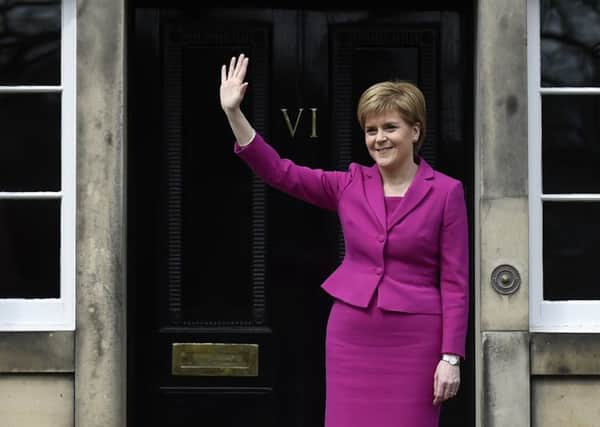Holyrood 2016: SNP to go it alone as Nicola Sturgeon rules out coalition
This article contains affiliate links. We may earn a small commission on items purchased through this article, but that does not affect our editorial judgement.


Ms Sturgeon secured 63 seats – just two away from overall control – in a win that sees the party make history by being the first to get three consecutive terms in government in post-devolution Scotland.
Speaking on Friday after the results had been announced she ruled out a formal coalition.
Advertisement
Hide AdAdvertisement
Hide Ad“With such a large number of MSPs elected I do not intend to seek any formal arrangement with any other party,” she said. She added she was encouraged by the “personal mandate” she has received to implement a “bold and ambitious programme for government”.
She said: “The SNP will make our case with passion, with patience and with respect. But our aim is to persuade, not to divide. We will always respect the opinion of the people – now and in the future – and we simply ask that other parties do likewise.”
She also added that education will be the defining priority of her tenure as First Minister, claiming: “I expect to be judged on it.”
Prime Minister David Cameron phoned Ms Sturgeon to congratulate her after the SNP’s victory. It was agreed the two governments would work together “constructively”, with a focus on the steel industry, a Number 10 spokesman said.
The Scottish Conservatives under leader Ruth Davidson are now Scotland’s main opposition with their best ever result of 31 seats knocking Kezia Dugdale’s Labour with 24 seats in to third. Opposition parties look set to line up against Ms Sturgeon on several policies, including laws aimed at tackling trouble at football matches and flagship cuts to airline taxes. She will also come under pressure to axe or halt controversial proposals to introduce a “named person” for every child in Scotland.
Ms Sturgeon will also face a challenge when it comes to getting her government’s budget through Parliament. Her dilemma will be whether to attempt to strike a deal with the high-tax Green and Labour parties or do the unthinkable and work with the low-tax Tories.
In her statement she said: “Election campaigns inevitably focus on differences and dividing lines but I believe that if we choose to find it, there is common ground aplenty to build on.”
Ms Davidson wasted no time in warning that Ms Sturgeon now faces a major headache on a range of flagship issues at Holyrood.
Advertisement
Hide AdAdvertisement
Hide AdShe said: “We will be ensuring that we make the Parliament work not just for us as an opposition party but we will be making it work for the people of Scotland and really, I hope, subject the SNP government to the scrutiny that they’ve not had in the past five years – and the sort of scrutiny, challenge and debate that is healthy in any Parliament and any democracy.
“Our manifesto specifically set out a series of issues and campaigns which we pledged to focus on in opposition.
“I and my team will now aim to deliver on these aims – demanding more funding for our colleges, supporting people suffering from mental ill-health and forcing change to the wrong-headed Named Persons law.”
The Tory leader also indicated she would push for reform of the Holyrood committee system, amid concerns they were effectively under the control of the SNP majority in the last Parliament.
“I would seek to have discussions on how we can review the apparatus of the Parliament and make it better,” she said. “It’s an imperative that we start that now.”
The final week of the campaign was dominated by the prospect of another independence referendum, with Ms Sturgeon indicating she thought it could happen in the next five years. Pro-independence parties still dominate, with the 63 SNP MSPs combining with the six Greens to pass the 65-mark needed for a parliamentary majority.
But Ms Davidson said the SNP’s failure to win a majority draws a line under that. “Whatever claims the SNP were pursuing with regard to constitutional brinkmanship over the next five years have now been utterly shredded. No mandate, no majority, no cause – the SNP must now let Scotland move on.”
Liberal Democrat leader Willie Rennie, who defied expectations to win the North East Fife seat from the SNP, said the “creeping arrogance” of the SNP would have to come to an end.
Advertisement
Hide AdAdvertisement
Hide Ad“They need to change their attitude – they’re going to have to have a pretty big handbrake turn in terms of their approach to politics.”
He also called for the new administration to draw a line under the constitutional bickering. “They’ve got to make a clear and unambiguous statement that another independence referendum – must be off the table for the next five years in order to respect the referendum result and this result.”
DOWNLOAD THE SCOTSMAN APP ON ITUNES OR GOOGLE PLAY
